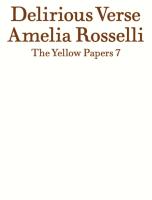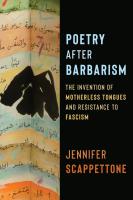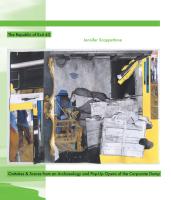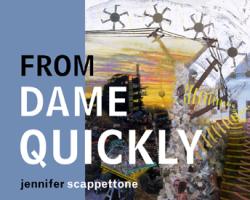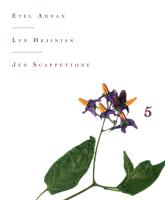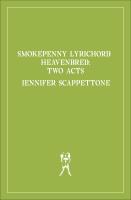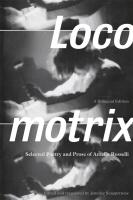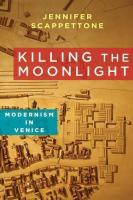
Synopsis
Jennifer Scappettone’s work resides in zones of confluence and cross-contamination of the literary, visual, and scholarly arts, on the page and off. Her research and teaching interests span the nineteenth through twenty-first centuries, with particular emphasis on ecopoetics, environmental justice, and the environmental humanities; art and activism; radical documentary; comparative global modernism; the history of the avant-garde and of marginalized art collectives; the evolution of cities, geographies of modernity, and critical occupations of place and space; poetry and poetics; literatures of migration, travel, and displacement; barbarism, translingualism, and other futures of language in global contexts; translation; Italian culture and its echo in others; gender and sexuality studies; relations between literary and other arts, including visual poetry, book arts, new media, and performance studies; and art and architectural history, visual culture, and aesthetics. She also works in Creative Writing and Romance Languages and Literatures, and is a faculty affiliate of the Committee on Environment, Geography, and Urbanization and the Center for the Study of Gender and Sexuality. She spearheaded, and currently advises, the Environmental Humanities + Arts Lab (The City and its Others).
Biography
I have devoted my research, writing, and teaching to interdisciplinary study of various underbellies of modernity: of what we call the Anthropocene and the Great Acceleration. Having grown up across the street from a toxic waste site and fallen in love with cities subject to flood and fire, my work across poetry and scholarship conducts archaeologies of vulnerable landscapes and of generations of communities who call them home. My work in poetics seeks to trace the utopian schemes and political consequences embedded in poetic language, as well as language’s metamorphoses across geographical borders and other scenes of translation.
My critical study, Killing the Moonlight: Modernism in Venice (Columbia UP, 2014), shifts the gaze of modernist studies from the rising urban centers of Paris, London, and New York to their shadow at the imagined edge of Europe: Venice. At once sheltered from modernization by the waters of a vast lagoon and prey to rising seas, this medieval cosmopolis becomes a haunt for artists and intellectuals grappling with the stakes and costs of modernity. Venice forms a crucible for modernist thinkers because its topography and cultural heritage seem to embody all that the modern ethos wishes to pathologize and suppress: the fluid, the feminine, the sentimental, the “Oriental,” the decadent and obsolete (characteristics spurned in the 1910 Futurist manifesto “Against Passéist Venice”). In Venetian incarnations of modernism, the anachronistic urban fabric and vestigial sentiment that both the nation-state of Italy and the historical avant-garde would cast off become incompletely assimilated parts of the new.
Theoretical and aesthetic questions raised by Killing the Moonlight surrounding Venice’s status as an “extraterritorial” locus come to the fore in my second critical monograph on poets lacking a single fatherland or mother tongue. Against a backdrop of xenophobic and ethnonationalist fantasies of linguistic purity, Poetry After Barbarism: The Invention of Motherless Tongues and Resistance to Fascism (Columbia UP, 2025) uncovers a stateless, polyglot poetry of resistance—the poetry of motherless tongues. Departing from the national and “global” paradigms that dominate literary study, and extending studies of translingualism to a key historical context that denies the continuum of cultural admixture and the humanity of the stranger—that of twentieth-century Fascism—the book traces the aesthetic and geopolitical resonance of “xenoglossic” poetics: poetry composed in the space of contestation between national languages, concretizing dreams of mending the communicative ruptures traced to the story of Babel. Authors who generate xenoglossic verse occupy languages without a perceived birthright or sanctioned education; they compose in ecstatic “orphan tongues” that rebuff nationalist ideologies on the one hand and globalization on the other as idylls of interconnection, uprooting notions of belonging ensconced in metaphors of milk, blood, and soil while rendering the reactionary category of the barbarian obsolete. Raised within or in the wake of fascism, these poets practice strategic forms of literary and linguistic barbarism that render the divisions between languages moot or obsolete while proposing modes of collectivity that exceed geopolitical definitions. Poetry After Barbarism explores how poetry can both represent and jumpstart metamorphosis of the sound and shape of citizenship, modeling paths toward alternative republics.
An abiding fascination with the poetics of displacement triggered my work on the “Babeling deeply moved” of Amelia Rosselli, a musician, ethnomusicologist, and self-described “poet of research.” Raised in exile from Fascist Italy between France, England, and the United States, Rosselli composed in the interstices among French, English, and Italian, estranging each from its conventional usages. Locomotrix: Selected Poetry and Prose of Amelia Rosselli was published in 2012 by the University of Chicago Press. Translations of Milli Graffi and other postwar and contemporary poets appear in Asymptote and in a special feature of Aufgabe, devoted to Italian “poetics of research” (a phrase borrowed from Rosselli). I am also the founding and ongoing editor of PennSound Italiana, a sector of the audiovisual archive hosted by the University of Pennsylvania devoted to contemporary Italian experimental poetry.
As a poet, I am committed to engagement with animate but invisible histories, site-specific engagements with troubled landscapes, radical collaboration, and experiments in aesthetic collectivity, including works that cross formal lines such as those of verse, digital media, and dance. I have collaborated with Deep Time Chicago, digital media artists Judd Morrissey and Ava Aviva Avnisan, composer Marco Ariano, and architect Seung Jae Lee and choreographer Kathy Westwater. My first poetry collection, From Dame Quickly (Litmus, 2009), takes as its point of departure Marx’s assertion about social relationships under capital based on a minor Shakespeare character, the innkeeper Mistress Quickly: “the objectivity of commodities as values differs from Dame Quickly in the sense that ‘a man knows not where to have it.’” My second collection, The Republic of Exit 43: Outtakes & Scores from An Archaeology and Pop-Up Opera of the Corporate Dump, (Atelos, 2017), excavates the ecological, medical, legal, and affective ramifications of a noxious suburban landfill on my block that was listed as a National Priority with the EPA’s Superfund program, while scoring the labyrinthine effort of researching the “malice in Underland” of polluted terrain.
My teaching in creative practice emphasizes experiments with the archive and exploratory approaches to the present moment, immediate engagements with Chicago’s distressed and utopian environments, and interdisciplinary and cross-media approaches to poetry, including the art of the book, while encouraging students to forge their own micropublishing ventures and literary collectives. In 2015-16 I shared a Mellon Fellowship in Arts Practice and Scholarship with Caroline Bergvall and Judd Morrissey to pursue a project titled "The Data That We Breathe" at the Gray Center for Arts and Inquiry, accompanied by a course on the poetics and politics of air. In 2024-25 I am hosting Geopoetics of Urban Rivers: Chicago to Seine, Calumet to Marne—and Beyond, twinned “floating” symposia between Chicago and Paris on the challenges and opportunities facing urban watersheds.
My research has been supported by fellowships from Harvard’s Villa I Tatti, the Stanford Center for the Humanities, the Wesleyan Center for the Humanities, the Gladys Krieble Delmas Foundation, the Mellon Foundation, the Huntington Library, the Getty Research Institute, Phi Beta Kappa, and the American Academy in Rome, where I was the Andrew W. Mellon Foundation Post-Doctoral Fellow in Modern Italian Studies for 2010-11. Locomotrix was awarded the 2012 Raiziss/De Palchi Book Prize by the Academy of American Poets and the Italian Ministry of Foreign Affairs Translation Prize; Killing the Moonlight was a finalist in the Modernist Studies Association’s annual book competition. I have been a resident at the Djerassi Foundation, the Bogliasco Foundation, iLAND, Nature Art Habitat Residency, the Whiteley Center, Civitella Ranieri and the Center for the Italian Modern Art. My current book project, "Pennies from Nether: A Score for Copper Lyre" was a finalist for the 2023 Creative Capital Award in Literature.
Select Publications
Books:
- Poetry After Barbarism: The Invention of Motherless Tongues and Resistance to Fascism (Columbia University Press, 2025)
- Killing the Moonlight: Modernism in Venice (Columbia University Press, 2014)
- Locomotrix: Selected Poetry and Prose of Amelia Rosselli, editor and translator (University of Chicago Press, 2012)
- The Republic of Exit 43: Outtakes & Scores from An Archaeology and Pop-Up Opera of the Corporate Dump (Atelos, 2017)
- Belladonna Elders Series #5: Poetry, Landscape, Apocalypse, featuring work by Scappettone, Etel Adnan, and Lyn Hejinian (Belladonna, 2009)
- From Dame Quickly (Litmus, 2009)
Journal Issues:
“julie ezelle patton: Arkitext,” Chicago Review 67:02/03/04 (Winter-Spring-Summer 2024)
“Positions of the Sun: Lyn Hejinian and Her Students,” Jacket2 (May 2024)
Selected Essays:
- “julie ezelle patton and the Geopoetics of Unrequited Care” and “Stanzas in Conversation,” Chicago Review 67:02/03/04 (Winter-Spring-Summer 2024)
- “Against the Preemptive Present: Some Things I Learned about Time, Space, and School from Lyn Hejinian,” Jacket2 (May 2024)
- “The Infinite Cartography of Etel Adnan,” for Open Door (November 2022)
- “Tempo,” for An Anthropocene Guide to Venice, ed. Shaul Bassi and Cristina Baldacci (Venice: Wetlands Books, 2022)
- “On ‘X-RAY,’ by ‘the Baroness’ Elsa von Freytag-Loringhoven,” The Difference is Spreading: Fifty Essays on Modern and Contemporary Poems, ed. Al Filreis and Anna Strong Safford (University of Pennsylvania Press, 2022)
- “Out of Marsh and Bog: H.D., Imagiste and the Poesis of HERmione Precisely,” for A Forest on Many Stems: The Poet’s Novel, ed. Laynie Browne (Nightboat Books, 2021)
- “Agitating a Copper Lyre; Or, Geolyricism for the Age of Digital Reproduction,” Geopoetics in Practice, ed. Sarah de Leeuw, Eric Magrane, Linda Russo, and Craig Santos Perez (New York: Routledge, 2020)
- “Amelia Rosselli’s Disintegrating Cantons: Songs for a Community to Come,” Exile and Creativity, ed. Alessandro Cassin (New York: Centro Primo Levi Editions, 2020)
- “Fog is my Land: A Citizenship of Mutual Estrangement in the Painted Books of Etel Adnan,” in Reading Experimental Writing, ed. Georgina Colby (Edinburgh University Press, 2019)
- “Chloral Lines: Toward a Feminist Pedagogy,” a pamphlet for the collection Urgent Possibilities: Feminist Poetics and Pedagogy, ed. Andrea Quaid (eohippus labs, 2020)
- “Smelting Pot,” in Dimensions of Citizenship: Architecture and Belonging from the Body to the Cosmos, catalog of the U.S. Pavilion for the 2018 Venice Architecture Biennale, published simultaneously on e-flux, ed. Nick Axel, Nikolaus Hirsch, Ann Lui, and Mimi Zeiger (New York and Los Angeles: Inventory Press, 2018/e-flux, May 2018)
- “Precarity Shared: Breathing as Tactic in Air’s Uneven Commons,” Poetics and Precarity, ed. Myung Mi Kim and Cristanne Miller (SUNY Press, 2018)
- “Phrasebook Pentecosts and Daggering Lingua Francas in the Poetry of LaTasha N. Nevada-Diggs,’” The Fate of Difficulty in the Poetry of Our Time, ed. Charles Altieri and Nicholas D. Nace (Northwestern University Press, 2017)
- Entries for Counter-Desecration Glossary, ed. Marthe Reed and Linda Russo (Wesleyan University Press, in press)
- “I 0we v. I/O: Poetics of Veil-Piercing on a Corporate Planet,” Jacket2, December 2016
- Prose and verse at the Poetry Foundation
- “Chloris in Plural Voices: Performing Translation of ‘A Moonstriking Death’,” Translation Review 95 (July 2016)
- “Festina Lente: Invention of the Modernist Poet as Editor in the City of Aldus,” Paideuma 42 (2015)
- “Cantonidisintegratidella / miavita”: Closure and Implosion of the Canto(n) in Amelia Rosselli, and the Dream (or Nightmare) of a Transnational Language,” Moderna: Semestrale di teoria e critica della letteratura 15:2 (2015)
- “In Correspondence: Laguna as Archive,” with Nathanaël, MAKE Literary Magazine, November 2015
Editorial Projects:
Edinburgh Critical Studies in Avant-Garde Writing and Edinburgh Foundations in Avant-Garde Writing
Aufgabe #7, devoted to Italian “poetry of research”
Selected Poetry Chapbooks:
- SMOKEPENNY LYRICHORD HEAVENBRED: Two Acts (The Elephants, 2018)
- From A Chorus Fosse (Oxeye Press, 2017)
- Ode oggettuale/Thing Ode (La Camera Verde, 2008)
- Beauty (Is the New Absurdity) (dusi/e kollectiv, 2007)
- Err-Residence (Bronze Skull, 2007)
More work across poetics, scholarship, translation, performance and the visual arts is available at this archive.

